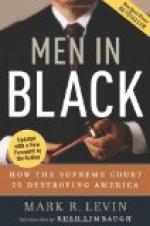“And so your Honor will realize that in the heat and excitement of a trial, in the turmoil of the legal battle, in the intensity of a forensic struggle, the young man may well have forgotten the respect and deference which is ever due from a member of the bar to the representative of high-minded justice.”
The judge seems unaffected by the appeal. The young man had been rude and impertinent, the fine of $250 must stand as punishment for his misbehavior.
Suddenly the pleader with a wave of his hand and a twinkle in his eye says: “Look at the difference between the position of a lawyer who, alert with restless energy, momentarily forgets his manners in fighting for his client, and on the other hand the calm”—pointing to the judge who is still half reclining in his chair—“the calm, I repeat, of complete judicial repose.”
There is a smile through the court-room. The judge straightens up, sees the humor of the situation, and the fine is remitted.
There is a constant play of opposing influences upon the judge. As an upholder of the law he becomes a formalist and a reactionary. The insistent demands of humanity which the statute law can never satisfy, tend to make him a revolutionist. The saving element for him is that he is only a part of a system for which he is not responsible.
When the judge has had the list of cases for the day called and has disposed of the applications for adjournments, he turns to the clerk who begins to call the roll of the men who are to act an important part on the stage—the jury.
The solution of the matter so far as the judge is concerned is to give him greater power. Let him be absolutely responsible for the conduct of a case in court. His position should not be that of an umpire who remains quiet until a dispute arises, but rather that of a head enquirer into merits, assisted by the two lawyers and the jury.
IV
THE ANXIOUS JURY
The main characteristic of the jury is that it does not want to be in court. The name comes from the French word Jure, sworn, or the man who has taken an oath. There is probably no reason to suppose that the word is derived from the state of mind in which a juryman finds himself, nor does it mean the words he has expressed with reference to his duty: more properly it is the men who are sworn to do justice. The implication of the word serve is that there is some punishment or penalty attached to jury duty. It is not regarded as penal servitude by the average man, but it seems near to it. While he is serving, his business goes to pieces, his wife misunderstands why he does not come home to dinner and his whole life is disarranged. When a man has served on a jury he gets a discharge paper.




